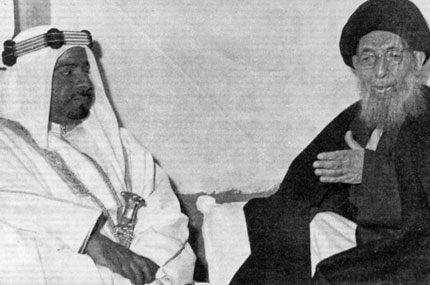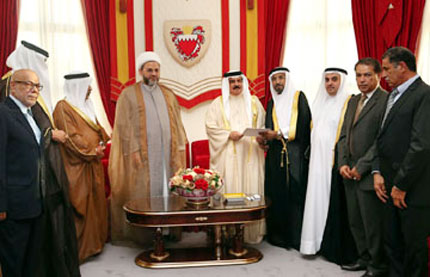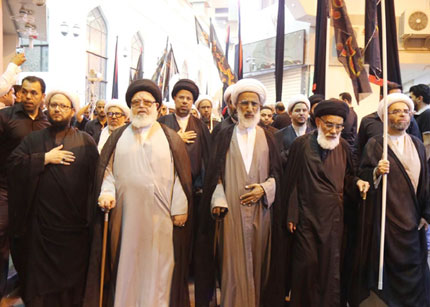
|
 |
 |
|
|
|
|
|
|
|
|
|
|
|
|
|
|
|
|
|
|
|
|
|
|
Religious Freedoms & National Constants in BahrainOpposing the government from within the existing system, is perfectly legitimate. There are legitimate channels which regulate this form of political work. To differ with and criticize government policies and positions is also legitimate. Confrontation and clashing mostly occur upon transgression of what is commonly known as the political ‘constants’. This refers to the agreed upon constants: maintaining the system of government; preservation of national unity; protection of religious and denominational diversity; rejection of violence as a methodology for change and political action. Although the overwhelming popular majority in Bahrain believes in these national constants, some political factions - not the grass roots - have caused a high level of political, social and security instability and confusion due to their contravention of these constants, whether it was consciously planned or otherwise due to being carried away in the heat of political conflict. There are some, for example, who want to change the political system and declare a republic, which is a violation of the constants, without even knowing exactly how to bring about this change, and whether it will take place through violence or otherwise. We have also seen deliberate attempts to disrupt national unity along sectarian lines, for the benefit of political conflict. The denomination and sect have been mobilized to serve the political project, which actually led to a rupture in Bahrain’s social ?fabric in a manner that is unprecedented in Bahrain’s history. Others have violated the constants of peaceful politics and demonstrated an inclination to use political violence. They have opted for violence despite the existence of clear channels for political activity – however narrow they may be perceived- which include parties, elections, civil society, the availability of press and media and freedom of assembly among others.
The constant of protection of religious and denominational diversity has made Bahrain a beacon among the countries of the region. But there are also those who seek to undermine this constant under political and religious pretexts. We say this, as we have just witnessed the popular and formal celebrations of the Diwali festival; seen the earlier Ashura’s celebrations, and are soon to witness Christmas celebrations, which are to be followed by celebrations of the birth of Prophet Mohammad. There are among the popular leaders those who do not appreciate the value of nation building, or the importance of the existence of the state in regulating the lives of citizens through modern methodologies. Perhaps this is mainly due to a cultural problem. The state (Al Dawla in Arabic) is not a respected entity in the Arab culture. The state, as denoted by its Arabic equivalent “Al Dawla” means ‘change’ as far as the Arab culture is concerned, which is contrary to the contemporary political culture that associates the state with ‘constancy’. According to the popular Arab psyche, the ‘state’ is the antonym of freedom, especially among nomadic tribes which prefer to wander about without the constraints of borders, passports and identities. Generally speaking, state property is not an object worthy of an Arab’s respect. Even if an Arab appreciates and refuses to violate personal property, he still would not respect state property and may even assault and loot it, if given the opportunity. Due to this, Arabs face problems in their countries in respect of building real states that command respect and prestige, so that citizens can identify themselves with the state and thus refuse to derogate or weaken it or violate its property (public funds). All an Arab can see is an encroachment by the state and an infringement on his own private harem, as well as a restriction of his freedoms of travel and expression. Even the ‘rentier state’ is not immune from its subjects’ assault on property, or even sabotage, as sometimes seen in parks and public toilets, not to mention pillage of public funds and increased corruption. This leaves the state brazenly ‘exposed to violation’ during peace as well as during times of political tension, when public property is among the target list for spoliation, arson or vandalism.
The concept of the ‘legitimacy of the state’, that is its right of sovereignty over its land and people, is still not instilled in the Arab conscience, given the state’s authoritarianism and lack of democracy, as well as its failure to realize the goals and aspirations of its citizens. In Bahrain, when the relationship between the state and the society had been reviewed and the era of reform began, the negative view of the state should have changed, which it did for a significant number of groups, especially among Shiites. But the Shiites problem, in particular, has deeply historical roots, which still persist in some cases. The old Shiite vision believes that government systems have usurped the position of authority, in what is known as the concept of the ‘state usurpations’. During the fourth Hijri century, Shiite jurists have slightly loosened the restriction against ‘serving with the unjust ruler’ as can be seen in the writings of Sayyed Murtadha Alam Al-Huda. However, when Sheikh Al-Karaki, the 10th century AD jurist, permitted participation in the state and serving with rulers, the restriction of ‘state usurpations’ was, to a large extent, broken. By the end of the last century (20th century) the Shiite view of the state and its legitimacy evolved further to allow participation and working in the state organs if it adopts the path of shura (consultation) and elections to the satisfaction of the people. Hence, the state was no longer considered a ‘foreign body’ nor was it deemed a sin to deal with the state or to partake in its functions. In Bahrain, it is evident that Shiites today, except for a few, do not see themselves as enemies of the state or as people who are beyond its authority . Nor can they resist the appeal of participating in the state institutions and influence its decisions to serve the common good, as long as the democratic space is available. But still, to benefit their current political stances against the system of government in Bahrain, there are a few who recall the old views and heritage of past jurisprudence which has been mostly abandoned by mainstream Shiites. These groups began to promote the concept that the state itself, not just the regime, is not legitimate and that it is not permissible to obey the state laws or to respect its property. They even permitted the assault on public property through vandalism and pillaging, as well as condoned the use of violence against the state and the pursuit of changing the system of government. Moreover, we read in their political militancy statements that they prohibit working with the state, assuming government posts or dealing with state officials whom they say should be boycotted. But the truth is that it is not possible to take Bahrain’s Shiites backwards, neither intellectually nor politically. The state in Bahrain is everybody’s, and is not the’ state of the privy’. Shiites, along with their compatriots, have contributed to establishing the State of Bahrain; voted for its independence in 1971 and its National Action Charter in 2001 and participated in the political process. Therefore, the separatist approach desired by the advocates of militancy does not only adopt an outdated thought abandoned by Shiites, but its pursuit can also lead to their own weakening and marginalization as well as the weakening of their homeland and the wrecking of their lives; an eventuality which can never be sought by those who are truly conscious and keen on the interests of their people.
Thankfully, this line of thought does not enjoy popularity. However, had it gained ground, it would have constituted a violation of the aforementioned four constants. It would have meant opening the door for conflict not only between the Shiites and the political system, but also between the Shiites and Sunnis, which could lead to the use of violence, and ultimately spark a civil war. During the latest Ashura celebrations, some abuses have occurred, which some sought to exploit in sowing dissension against the system of government. They resorted to striking the chord of the constant of protecting religious freedoms, which they claim no longer exists because the ruling system does not adhere to it. Thus, this minority took the matter to the extent of promoting boycott and confrontation with the political system. As far as the government is concerned, Ashura’s event was the same as in every year. The Minister Interior received members of the Hussainya Processions Authority before the start of Ashura’s festivities, and discussed with them the security and regulatory procedures for marches and processions. For his part, as in every year, and as an expression of the strengthening of national unity in special and religious events, the King made financial and in-kind donations for every Shiite Hussainiya hall in Bahrain, although plentiful and numbering in hundreds. As has long been the case every year, there was an official holiday for all Bahrainis, during the days of Tasooa and Ashura (9th &10th of the month of Muharram respectively). Again, as in every year (this year was no exception) following the end of Ashura ceremony, the King received members of the Hussainya Processions Authority who paid tribute to His Majesty for “issuing royal directives to all ministries, government bodies and entities, to ensure that rituals are held in a manner befitting the occasion’s sanctity, by providing all government services and facilities efficiently and in the best possible ways” and for His Majesty’s “personal follow up to ensure optimal delivery of all services and security-related requirements, as well as overcoming any incidental challenges and obstacles”. The Hussainya Processions Authority said that the King’s meeting with its members is “proof of His Majesty’s keenness on ensuring the good organization of all matters relating to marking the memory of Ashura annually. This also reflects his firm belief in diversity, tolerance and religious co-existence between all categories of the social spectrum, as enshrined in the constitution of the Kingdom of Bahrain, as part of the reform project”. For his part, His Majesty the King, this year, was keen on underscoring the national constants, specifically those related to religious freedom and communal coexistence, which is a message addressed to all Bahrainis, that: Firstly- The high level of religious freedoms achieved in Bahrain is “a decades-long specificity of the Bahraini society which has exercised generational co-existence, that was demonstrated through its keenness on religious and denominational diversity and the protection of social fabric and national cohesion”. Secondly- Religious freedoms are enjoyed by all: residents, citizen and all religions. His Majesty expressed his pride “in the high level of religious freedom in Bahrain, where people exercise their religious rituals without any discrimination or division” Thirdly- Religious freedoms fall under the umbrella of national unity and special religious events open opportunities for cooperation and harmony, rather than discord and division. Thus, His Majesty stressed “the importance of these events and the need to bolster the principles of cooperation and fraternity between all subjects of the Kingdom of Bahrain, under the banner of their national unity and Islamic values “ |


